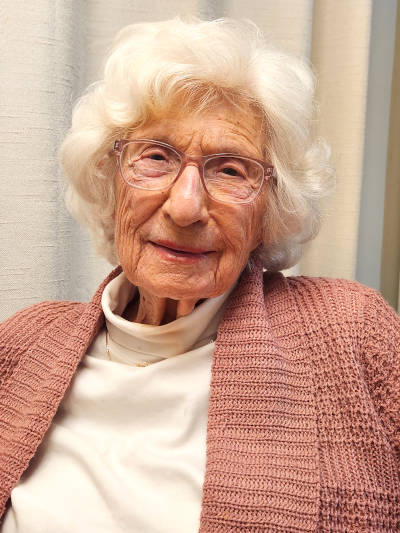
Dr Sarah Traister Moskovitz died on Sunday 1 September 2024. She ended her own life, and went peacefully, surrounded by her family.
Sarah had nearly completed translation of this collection when she died. We will continue to publish her translations every week. Miri Koral has offered to step in as editor, and complete any unfinished work. We extend our profound thanks to Miri for helping to complete this work.
Sarah was born on 18 August 1927, in Brooklyn, New York. She grew up speaking Yiddish in the home and only learned English when she went to school. She was one of the last native secular Yiddish speakers alDr Koralive before her death in September 2024.
Sarah would later gain her doctorate from Yeshiva University in Psychology while raising children with her husband, Itzik Moskovitz. After attaining her Ph.D, she would teach at California State University Northridge at a time when very few women were in academia.
As part of her work, she set up a network of support groups for child survivors of the Holocaust. This idea would spread globally as a way for child survivors to work through their shared trauma together.
Sarah was an avid poet herself and has published several collections of her work: Kumt Tzum Tish / Come to the Table, the separate Holocaust anthology Poetry in Hell, and her translation of The Song Remains.
Sarah credited The Song Remains translation project with extending her life for several years before her death on 1 September 2024, at age 97, a year after Itzik’s death in 2023. Both are remembered by their children; Debrah, Ruth, and Dave, by the many child survivors and others whose lives she touched, and by Sarah’s project; The Song Remains.
Sarah was a poet, and this is a poetry site, so we thought it only fitting to include one of her last poems, “Hands”.
Hands
Sarah Traister Moskovitz
I was standing at the sink peeling garlic when I remembered
the smell of garlic on my mother’s hands when I was small,
hands that brushed the hair back from my forehead with a light touch
that held my face up as she looked into my eyes,
and called me “boobaleh”,
that took my spoon to coax me
to eat just one more “far dayne zise beindelakh”
for your sweet little bones.
Her hands were soft and small
never forcing, never threatening,
warm sepals around the bud of me.
My father’s hands held threat;
a yank, a pull, a slap, a fist were always possible.
The same long fingers pointing out the world,
the beauty of clouds, sunsets, plants and animals,
the magic of picture books and alpha-bet
could turn to iron pliers
ripping, shaming, hurting
crushing the bud of me.
My mother did laundry by hand.
She stirred mushroom-barley and chicken noodle soup
lifted the cover on pot roasts, cored apples, peeled potatoes
chopped herring in a wooden bowl.
On Fridays she mopped the kitchen floor and got down on her knees
to scrub the bad spots and thank God for a home,
then got up to make a path of Yiddish newspapers full of blood and death from overseas
for us to step on as we walked safe across the wet, clean floor.
And if my father wasn’t home she listened to Stella Dallas, another orphan
reassured that Stella’s troubles were worse than hers.
I married a guy with hands more powerful than my father’s;
Itzik has the golden hands that can fix and build anything.
He built our first television set, a trailer to go camping in with young children,
years later a room for grown-up married kids.
His hands have endless patience and dexterity to unravel knots
fasten clasps, put keys on rings and unjam anything that’s stuck under a hood.
His hands are safe and good to me… like my mother’s;
making soup,
making love,
making a garden… making life.